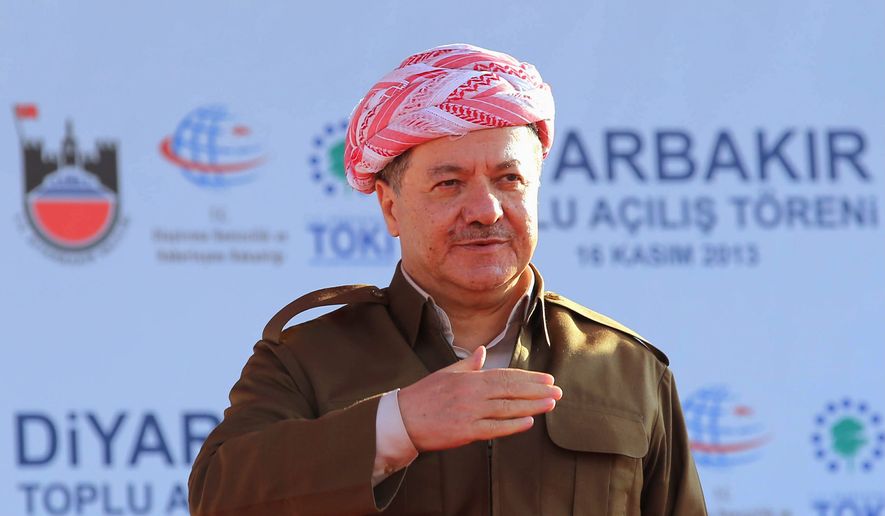Friction between Iraqi Kurdish political factions soared Monday, a day after longtime regional leader Masoud Barzani announced his resignation following weeks of turmoil surrounding his failed push for an independent Kurdistan.
Two Kurdish parties who oppose Mr. Barzani and either stood against or reluctantly went along with his September independence referendum say their offices have been ransacked in the semi-autonomous zone of northern Iraq controlled by the Kurdistan Regional Government.
KRG leaders quickly condemned the violence Monday, which analysts said was likely carried out by loyalists of Mr. Barzani’s ruling Kurdish Democratic Party — triggering fears of a return to internal divisiveness that saw a 1990s war rage between the opposing Kurdish factions.
The inter-Kurdish tensions heighten fears of continued instability in Iraq even with the recent ouster of Islamic State from its strongholds in Mosul and Tal Afar. The terror group, which overran huge swaths of Iraq three years ago, now controls just a sliver of the country.
Mr. Barzani, 71, said Sunday that he would give up his position as KRG president on Nov. 1, roughly six weeks after Kurds voted on the controversial independence referendum that Mr. Barzani had championed. The referendum passed, but faced an immediate backlash and economic pressure from Baghdad and from Iraq’s neighbors dealing with their own restive Kurdish minorities. Tensions skyrocketed between the Iraq’s military and Kurdish forces, particularly around the disputed, oil-rich city of Kirkuk near the southern edge of KRG territory.
The Trump administration has relied on a fragile alliance between the Iraqi military and the peshmerga to help fight battle against Islamic State. Concerns are also high over the role being played by Iran-backed militias, who are aligned with the Iraqi military.
Iran’s government has stood against a Kurdish state across the board in Iraq, putting the Trump administration in a difficult diplomatic position. The White House was on the same side with Iran in opposing the KRG independence referendum, but Secretary of State Rex W. Tillerson has also called for the Iran-backed militias to leave Iraq. Militia leader Abu Mahdi al-Muhandis told The Associated Press on Monday the mainly Shiite paramilitary fighters known as the PMF have no intention of leaving.
“The future of the PMF is to defend Iraq,” he said, insisting the Iraqi army and policy need the militia’s help to maintain security.
U.S. officials are now focused on preventing an all-out meltdown among various Kurdish factions and with the central government in Baghdad.
Iraqi Prime Minister Haider al-Abadi responded to the referendum by banning international flights to the region and demanding a halt to all crude oil sales by the KRG.
The State Department, meanwhile, praised Mr. Barzani’s decision to resign, saying Monday that U.S. officials are eager to work with current KRG Prime Minister Nechirvan Barzani — the resigning president’s nephew — and Deputy Prime Minister Qubad Talabani.
Mr. Barzani ran the KRG since 2005 with a firm hand as the region prospered while the rest of Iraq struggled in civil war. While it’s not clear he has permanently left the political scene, his decision to step down has exposed deep fractures among the Kurds. Two Kurdish parties — the Patriotic Union of Kurdistan (PUK) and the Movement for Change, also known as Gorran — claimed their offices in the Duhok area north of Irbil were looted or burned overnight Sunday, the Reuters news agency reported. No casualties were cited.
The PUK, long the main rival of Mr. Barzani’s ruling Kurdish Democratic Party (KDP), reluctantly supported his decision to hold September’s independence referendum, while the reformist Gorran party opposed the decision on grounds the timing was not ripe for such a provocative vote.
Some analysts say KDP backers may be taking action against the other two parties. “Most likely those who attacked the PUK and Gorran offices were KDP supporters,” said Harith al-Qarawee, a nonresident Senior Fellow at the Atlantic Council’s Rafik Hariri Center for the Middle East.
“The offices were burned in Zakho, northern Duhok, which is a KDP stronghold,” Mr. al-Qarawee said. “They seem to be a combination of a spontaneous angry reaction by KDP supporters and possibly by unaffiliated people who blamed PUK and Gorran for the Kurdish division, and what could be a deliberate retaliation by some KDP loyalists to force political rivals to leave their areas.”
• Guy Taylor can be reached at gtaylor@washingtontimes.com.




Please read our comment policy before commenting.